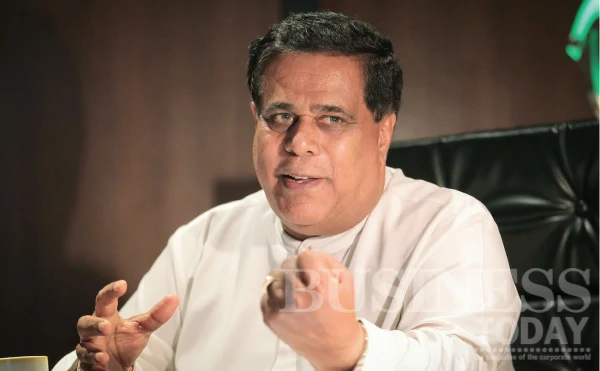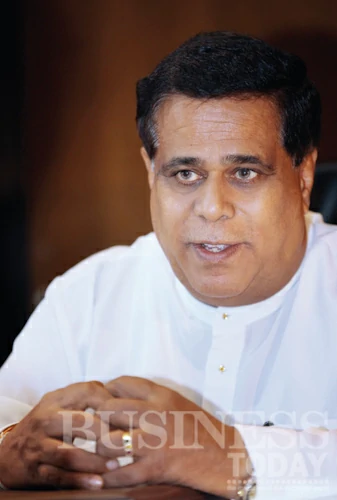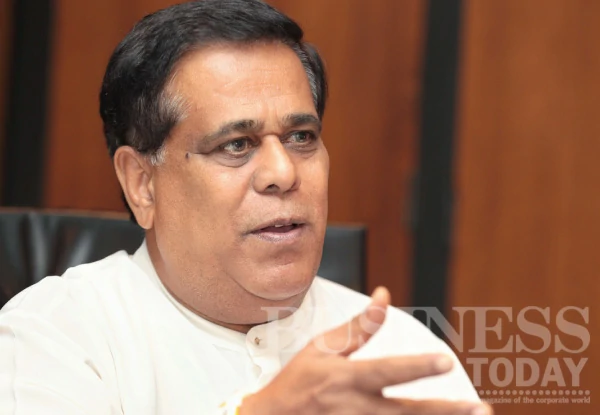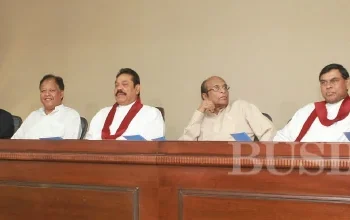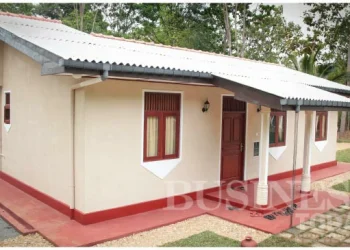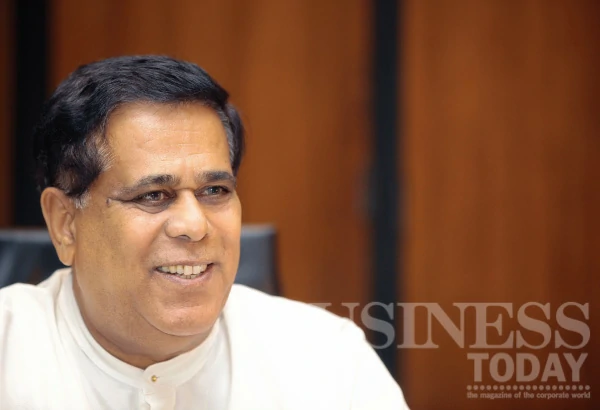
In a day and age where becoming a politician is easy and taken for granted, there are those who have worked hard and earned the positions that they hold today. Minister Nimal Siripala De Silva needs no introduction. He has journeyed on a political path for 30 years where he has not wavered from the principles and ethics that the Party – Sri Lanka Freedom Party (SLFP) – stands for and what he believes in. He has stood firm with the SLFP through good times and bad, and has always ensured that the identity and interests of the Party are always maintained. He has never switched sides and he always believes that a person earns the positions they hold. He is well loved by the people of Badulla and Borella, where he has served tirelessly. A veteran politician that should be emulated.
By Udeshi Amarasinghe | Photography Menaka Aravinda and Mahesh Bandara
Who is Nimal Siripala De Silva?
A lawyer turned politician.
What can you tell us about your 30 year long journey?
I became interested in politics in 1965 during the General Elections, when I was a student at Nalanda
College, Colombo. My hometown is Badulla and as such I was boarded in Colombo to attend school. I used to study at the Public Library as I was staying in Wanathamulla at that time. At the library I used to meet students from other schools, student activists, university students and law students who were interested in politics. I was the leader of the debating team at Nalanda College and naturally, we were interested in politics at that time.
My parents were teachers and our family comes from a SLFP background. During the General Election campaign, the SLFP was looking for an orator who could give a speech on behalf of the student population at a rally, held in support of Madam Bandaranaike at the Town Hall. My friends suggested that I should give the speech. That was the first time I met Madam Bandaranaike and I addressed a rally at the 1965 elections.
I entered Law College in 1966.
I was the architect of the Sri Lanka Nidahas Paksha Nithi Shishya
Sangwidanaya, which is the SLFP Law Students Association. Dr Jayatissa De Costa, President’s Counsel and
Mr Upali Samaweera, President’s Commissioner were my contemporaries at Law College. We did not have much following for the SLFP, since it was a time where we had lost the 1965 elections. However, from 1965 to 1970 was a time that we worked very hard for the Party because there were a lot of agitation against the UNP Government. As the president of the association and as a student activist I was in the forefront. There were two burning issues for the students, one was the District Quota System; we were in favour of the District Quota System because it would benefit rural students. There were many arguments for and against it, but in 1970 when Madam Bandaranaike came back to power the District Quota System was introduced. The second issue was ragging. There was much discussion and agitation against ragging, we supported anti ragging, that is myself and Dr Buddhadasa Bodhinayake who was in the Medical College at that time. To stop ragging at the Law College, I invited Buddhist priests to chant
Seth Pirith so that no one could rag new students.
I worked very closely with Madam Bandaranaike during the 1970 election. I travelled the length and breadth of this country, addressing election rallies as I was a good orator. We had the Tharuna Sinhala Sanwidanaya, a youth organisation that supported Madam Badaranaike. In 1971, I passed out as a lawyer and thereafter I went to London in 1975 for my higher studies having practiced as a lawyer for four years. I revamped the SLFP organisation in the UK and I was elected as the president of the organisation. Subsequently when Madam Bandaranaike was about to lose her civic rights after the 1978 elections, I came back to Sri Lanka overland through the Kybher Pass.
From That Time Onwards I Have Been Working For The Party And I Have Appeared For The SLFP In Court On Numerous Occasions Without Any Charges Or Fees.
Upon returning, I became very busy helping Madam Bandaranaike because there was a move to appoint a Presidential Commission of Inquiry against her. When the Presidential Commission of Inquiry was appointed, myself, Mr V K Kularatne, Mr Gomin Dayasiri and Mr D S Wijesinghe and Mr H L De Silva, a private lawyer who had moved out of the Attorney
General’s Department and submitted an application to the Supreme Court for a writ against the Commission.
Thereafter, I still remember when I brought that to the notice of Mr Bakir Markar, the Speaker of Parliament at that time, he said, “young lawyer you should know the rules of procedure. A writ cannot stop the proceedings in Parliament.”
From that time onwards, I have been working for the Party and I have appeared for the SLFP in court on numerous occasions without any charges or fees. To name but a few, the Presidential Election Petition filed by Mr Hector Kobbekaduwa against President Jayewardene, Presidential Petition filed by Madam Sirimavo Bandaranaike against President Premadasa, Mahara election petition by Vijaya Kumaratunga, Mulkirigala election petition, Hakmana election petition by Ariya Bulegoda and Akmeemana election petition by Richard Pathirana. I volunteered and helped the party. Many people who had been victimised by the then Government came to me. Madam Badaranaike greatly appreciated my work and dedication towards the Party.
At The Same Time I Was Appointed As The Organiser For The Borella Electorate. With This I Came Into The Mainstream Politics And Associated Myself With The Sri Lanka Freedom Party And The Party Leadership.
In 1983 when the Colombo Municipal Council elections were to be held and Madam Bandaranaike wanted a new face, though there were stalwarts in the Colombo Municipal Council such as Ananda Premasinghe, Bandujeewa Perera, Sumathipala Jayawardena and Alavi Moulana. She persisted that a new person should contest and she invited me to be the Mayoral candidate for the SLFP in the 1983 elections. I could not win, but I became the Leader of the Opposition of the Municipal Council.
At the same time she appointed me as the organiser for the Borella electorate. With this I came into the mainstream politics and associated myself with the Sri Lanka Freedom Party and the Party leadership. Thereafter, in 1989, I contested the Colombo District under the hand symbol of the SLFP. Bernard Soysa, Haleem Ishak, C V Gooneratne, Kingsley Wickramaratne and Stanley Thilakaratne were very seasoned politicians and I was very new. However, I was elected to Parliament. Of course we had a very tough time in Parliament in the Opposition. There were many threats and undue influences, but still we stood against those and worked for the Party. I was assaulted at the Kosgashandiya when I was addressing a meeting. Then, after the 1982 Presidential elections, I was taken to the fourth floor of the CID to be questioned about the rice ration cards. There was a very famous rice ration card at that time and I was the legal advisor to Ossie Abeygunasekera. I was the architect of that rice ration card, and I advised Ossie Abeygunasekera to prepare that in such a manner as not to get caught in the legal process. I was taken to the fourth floor and questioned, and I stated that I acted on behalf of a client on my capacity as a lawyer and what was said by the client is a privileged communication. On that ground I declined to make a statement. Therefore, they could not charge me. Those are some of the things, which I remember even today.
1994 elections and beyond?
During the 1994 election, I won by a very large majority with 114,000 votes in the Colombo District and became the Minister of Housing and Construction. Thereafter I was appointed as then the Minister of Health, Minister of Post and Telecommunication and finally, Minister of Irrigation and Water Resources. Her Excellency Chandrika Bandaranaike Kumaratunga said that I should go to Badulla District, because I was born there. My mother was still living there, my parents had taught in about 22 schools in the Badulla District and I had family connections in the district. Once when we went for a meeting in Badulla, the people asked Madam Chandrika to send me to Badulla because Badulla was very much underdeveloped and they thought if they could get a powerful minister then that district could be developed. On that basis, the President asked me whether I am willing and I said yes. That is how I went to Badulla and became the Minister for Uva Wellassa Development, where I could serve the people.
I Was The Longest Serving Minister Of Health In The South East Asia Region And I Became The Chairman Of The Executive Committee Of The World Health Organisation As Well As The President Of The World Health Assembly.
The other salient feature in my political career is that I was entrusted with the most dangerous work, that is just after the Jaya Sikurui Operation, I was appointed as the Chairman of the Northern Rehabilitation Programme. I travelled 11 times to the Jaffna peninsula and on my 12th visit, a suicide bomber blasted the vehicle I was travelling in with General Hamangoda; 29 people died, but I survived. I still carry a small piece of shrapnel in my brain. It went through my right ear and went through the mastoid bone and remains in the outer periphery of the brain. I was taken to the UK and I was treated there by Prof Richard Haved, the famous neurosurgeon. I had to continuously travel to the UK for treatment for four years because there was so much of debate whether that small piece of shrapnel should be removed or not. I still remember Prof Haved telling me “Minister, God has saved you once why should I go and meddle with it.” He preferred for that piece to be kept as it is.
His Excellency Mahinda Rajapaksa appointed me as the leader of the peace delegation that went to
Geneva and Oslo for talks with the LTTE. At the meeting when I met Anton Balasingham for the first time I told him, “the LTTE wanted to kill me, but I survived and I have been fortunate enough to meet you and talk about peace.” That would have affected him psychologically.
I Am Proud That I Have Been Able To Come To This Level In My Political Career Without Any Political Background To Start With… My Success Is Due To The Fact Is That I Never Changed My Party.
I was the longest serving Minister of Health in the South East Asia region and I became the Chairman of the Executive Committee of the World Health Organisation as well as the President of the World Health Assembly. I am the first Asian to hold that post. I served on the Executive Board of the WHO, for three terms, and I was the Chairman of the International Coordination Committee on Health, Audit Committee and many other powerful committees in the arena. I have participated in over 75 conferences as a resource person on the invitation of many organisations, so I am happy that I was given this opportunity that entailed professional interaction in the world health arena and also to bring repute to Sri Lanka. I recall when I was elected as the Chairman of the World Health Organisation, more than 3,000 LTTE supporters surrounded the Palais where this meeting was held. They switched off the electricity and the meeting was interrupted for about five minutes and I was provided with armed guards by the Swiss Government thereafter. With all those challenges, I was able to perform my duties and at the same time my Party as well as the Party leaders have been very generous towards me. Madam Sirimavo Bandaranaike, Madam Chandrika Bandaranaike Kumaratunga and President Mahinda Rajapaksa have treated me in very high esteem and I was unanimously elected as the Senior Vice President of the Sri Lanka Freedom Party, which is the post I hold today. For two consecutive terms, I have been elected as the Leader of the House of Parliament.
I am proud that I have been able to come to this level in my political career without any political background to start with. None of my relations, my father or uncle or aunt, did politics.
I worked hard and I made it on my own and I have climbed the SLFP ladder to attain one of the highest positions. I am happy about that. I am a very happy politician, because I could serve the people of my country especially the people of Uva Wellassa.
I Was Able To Climb The Ladder To One Of The Very Highest Position In The Party, And Kept My Reputation As A Party Man Because I Did Not Change Parties For Political Gain.
You have been able to be elected to Parliament and have been with the people for 30 years. At a time when getting into Parliament is taken for granted what are your thoughts on this?
My success is due to the fact that I have never changed my party. There were two instances where the SLFP was about to break. One such instance was the Anura-Maithri defection. At that time when Madam Bandaranaike lost her civic rights, Anura and Maithripala Senanayake and their group broke away from the Party and they wanted me to join them as well. But I never left the leadership or the Party. The second instance was when Chandrika, Vijaya, Mr Illangaratne, Mr V W Kularatne and others broke away and established the Mahajana Party. Madam Chandrika and Vijaya were my closest political as well as personal friends, but I did not abandon the Party. That is how I was able to climb the ladder to one of the very highest position in the Party. I kept my reputation as a party man, because I did not change parties for political gain.
You first entered Parliament from Borella and then your electorate became Badulla, but the people in Borella still respect you, and you have not forgotten them. What are your thoughts?
Borella was a difficult electorate because there is a mixture of people, from the affluent to the poor. The rich live in Colombo 7, and in Borella and Wanathamulla areas you find people living in slums and under very difficult conditions. If you take Borella South, it is the business community that is predominant and people from all communities live in that area. Further, Mr M H Mohammed was a leader who has done a great service to the Borella electorate and fighting with him was not an easy task. But I still managed to do it and I did it with dignity.
The people of Borella love me because after I became a Minister
I have done extensive public work for them as well as looking into their needs. Leaving Borella was a little difficult for me, but I had to look
at the bigger picture because Uva
Wellassa was a very backward area, where development had not taken place. I thought I must serve the people of that province. I put a lot of effort to serve the people in that area.
I would go there every weekend, and sometimes even twice a week. Since there were no good carpeted roads like today it took about six to seven hours to get there. We have developed the area very well, including roads, schools and other infrastructure and I am happy that I have been able to help the people of Uva Wellassa.
Can you elaborate on the development in the Badulla electorate?
In Badulla, the bus stand, the hospital and all other infrastructure facilities have been provided through my initiation. Though I was not the Minister of Transport, I managed to have bus stands in all the towns of the Badulla District. Then medical facilities and hospitals, the Badulla hospital has become one of the best hospitals in Sri Lanka in terms of quality of care and facilities. There were many cancer patients travelling from Badulla to Maharagama. I have established one of the best cancer treatment centres in Badulla. Then the Uva Wellassa University; there was no university in the Badulla District earlier. There is so much of work that I have done for the district.
What can you tell us about your responsibilities as the Leader of the House?
As the Leader of the House of
Parliament I am responsible for pushing through Government legislations and also defending the Government in Parliament. That is by answering questions and queries raised by the Opposition and at the Party Leaders meeting. Then, preparing agendas for discussion where I have to be fair to the Opposition as well. I must have a closer interaction with the Speaker and the Opposition Whip and ensure that the Parliament functions smoothly.
You are known as a person who has also stood with the SLFP, unwavering. Even when the UPFA alliance was formed, you ensured that the SLFP identity was maintained. What can you tell us about this?
When the UPFA Government was formed, I was responsible for drafting two agreements. I became a very controversial figure, because I stood for the SLFP. Even Minister Wimal
Weerawansa in one of his speeches, in Borella, said how difficult it was for them to bargain with me because
I always looked at the interest of the SLFP.
You are respected by all parties, for being neutral and independent.
Your thoughts on this?
I am not neutral. I am for the Party. When it comes to politics, I fight very hard. But personally I have no grudge against anyone. There are some people who take the political rivalry as a personal animosity. Sometimes we do not agree with the UNP, JVP or with TNA – that is on principle and policy. But that does not mean that human interaction and relations that you have with the MPs and leaders should be negated. You need to always have a good relationship not only with your friends but also with your political opponents. That has been my consistent policy.
But how are you able to stand by your ethics and principles in an era where everything can be bargained with?
There are many people who promote either their wife or brother or other relations as their successors. But I never did that. There was a huge demand from the people in Borella that my wife should contest the Provincial Council election, but I did not agree. Then, in Badulla District there was a demand for my sister, who is working very closely with me in the political arena, to contest in the Provincial Council elections, but I declined. Nevertheless I have brought in young educated people in my electorate as my successors.
You mentioned that you started working with the SLFP actively in 1965 and until 1983 you worked for the SLFP without any political positions. Today, we do not see this attitude in young politicians. Everyone wants a position or to get into Parliament. What are your thoughts on this?
May I say that the political culture has tremendously changed in the present day. Those days it was difficult to obtain a place to contest even from the SLFP or UNP or from any political party. You had to first work for a very long time. Then only are you given a position. Even when I became the organiser of Borella, it was not that easy, because there were so many people
who were suitable for the position;
Mr Sumathipala Jayawardena and
Mr Ananda Premasinghe wanted to become the organiser, then there were myself and many others.
But now of course the situation has changed.
On The Deteriorating Quality Of The System, My Personal View Is That This Preferential Vote System Has Brought In Many Problems Into The Political Arena.
When the overall quality of the politician is diminished what will happen to the country?
It depends on the political system as well. You cannot blame only the politician. On the deteriorating quality of the system, my personal view is that the Preferential Voting System has brought in many problems into the political arena. There is in-fighting within a party, more than you fight with your opponent you fight within the party. Also, various devious methods are used by people to get the preferential votes. I always believe we need a more refined political system.
What is the future of politics in
Sri Lanka?
We have started the process of modifying the Preferential Voting System. We have started with the local government bodies. I am sure that will improve the political culture and there will be better representatives who are responsible for a particular defined area. If we could bring the similar changes to the Provincial Councils as well as to Parliament, it is my personal view that it will be good for the future of politics in this country.
Another important aspect is the political awareness of the people since they are the vey same people who are voting and creating politicians.
Media, non government organisations and civil society all have that responsibility of educating the public. Various people are playing different roles, this will have a cumulative effect on the political culture of a country. If opinion makers do not perform their roles properly that will create adverse situations. Therefore, it is necessary to guide the people. Sometimes we blame saying that criminals and people without any education have got into politics, but they are the choice of the people. Therefore, we cannot blame anyone because we have to give prominence to democracy and the choice of the people.
We have seen in some instances where a candidate may have lost the election, but they enter Parliament through the National List. What are your thoughts on this?
I do not agree with you. Say someone may not be elected by the ballot, but sometimes we may be able to put a better person such as a professionally qualified person through the National List to Parliament. So it has its own merits and demerits. That is why a mixture is necessary, while giving effect to the people’s wish, we also need to think about the area where there is a vacuum.
Your future plans?
To continue with politics for the benefit of the people of my country.
